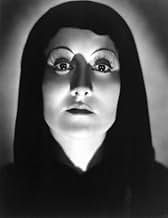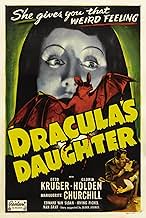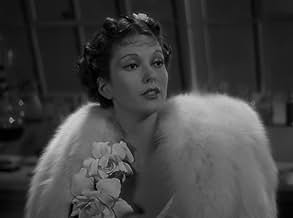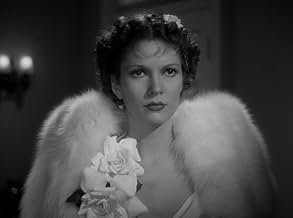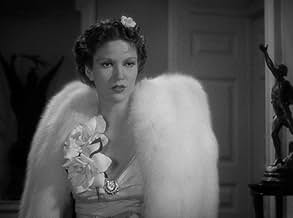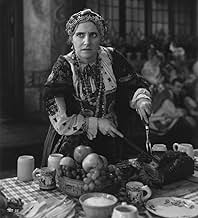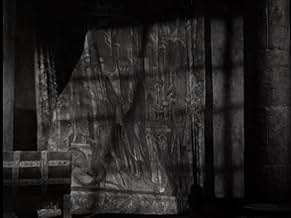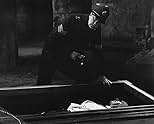IMDb-BEWERTUNG
6,3/10
8674
IHRE BEWERTUNG
Füge eine Handlung in deiner Sprache hinzuWhen Countess Marya Zaleska appears in London, mysterious events occur that lead Dr. Von Helsing to believe that the Countess must be a vampire.When Countess Marya Zaleska appears in London, mysterious events occur that lead Dr. Von Helsing to believe that the Countess must be a vampire.When Countess Marya Zaleska appears in London, mysterious events occur that lead Dr. Von Helsing to believe that the Countess must be a vampire.
- Auszeichnungen
- 1 Gewinn & 1 Nominierung insgesamt
Halliwell Hobbes
- Hawkins
- (as Halliwell Hobbs)
Claud Allister
- Sir Aubrey
- (as Claude Allister)
Agnes Anderson
- Elena
- (Nicht genannt)
John Blood
- Bobby
- (Nicht genannt)
David Dunbar
- Motor Bobby
- (Nicht genannt)
Douglas Gordon
- Attendant
- (Nicht genannt)
Owen Gorin
- Groom's Friend
- (Nicht genannt)
Empfohlene Bewertungen
As the last movie completed before the Laemmles were ousted from control of Universal, DRACULA'S DAUGHTER holds some interest as a place marker, surely; now, the men who had fought the patent trust and had largely given way to the next generation. Yes, Zukor was hanging in as Chairman at Paramount, but with vastly curtailed power; DeMille was beginning his own renaissance -- by becoming a parody of himself -- and Lasky was still fading, although he would continue to produce increasingly ponderous prestige films over the next dozen years. Only Goldwyn would prosper -- but no one liked him.
But this is Dracula's Daughter I'm talking about, and it's just fine. I like Lambert Hillyer's frequently matter-of-fact handling of the movie, with its complicated lesbian and Triple-Goddess subtext. I can't see all the money on the screen (over a quarter of a million dollars -- a huge sum for Universal), but I am amused by the opening, with its "All right, Doctor, you've killed Count Dracula. You're claiming an insanity defense, are you?" attitude.
But this is Dracula's Daughter I'm talking about, and it's just fine. I like Lambert Hillyer's frequently matter-of-fact handling of the movie, with its complicated lesbian and Triple-Goddess subtext. I can't see all the money on the screen (over a quarter of a million dollars -- a huge sum for Universal), but I am amused by the opening, with its "All right, Doctor, you've killed Count Dracula. You're claiming an insanity defense, are you?" attitude.
Dracula's Daughter begins right where Tod Browning's Dracula left off, and ironically sees vampire slayer, Van Helsing in trouble with the law for the murder of Count Dracula. This follow up doesn't have the same quality feel about it that the original had, and it seems clear that this was always meant to be very much a 'B' movie picture. But at the same time, its lots of fun to watch; and the fact that it begins straight after the ending of the Bela Lugosi film ensures that it's credible as far as Universal's series is concerned, and that fact will also give many fans of the original film a good reason to see it. The plot starts properly when a young woman turns up at the police station, wanting to know if Count Dracula really is dead. We then follow her as she tries to undo her family curse, aided by psychiatrist Dr. Jeffrey Garth. However, around the same time that this is going on; corpses begin appearing around London, and jailed Van Helsing is convinced that vampires are roaming the streets of London again.
Unfortunately, this follow up doesn't feature the bloodsucking demon of the first film, and as the title suggests; follows his daughter instead. Gloria Holden excels in the title role as the daughter of Dracula. She's seductively sexy and has a definite air of understated evil about her at the same time. The rest of the support cast back her up excellently, and while nobody other than the title character is a real standout; the ensemble comes together nicely. Atmosphere is obviously a big thing here, and director Lambert Hillyer does a great job of photographing the locations, and ensures that the film benefits from a malevolent aura at all times. The story is obviously nowhere near as great as the original, which was based on the novel by Bram Stoker; but it's good enough. Writing a follow-up to Dracula can't be easy, and while the plot isn't too engaging, it's always at least interesting. There's an underscore of black humour hanging around just behind the central plot, and overall I would say this is a worthy sequel, although it's not a patch on the original film.
Unfortunately, this follow up doesn't feature the bloodsucking demon of the first film, and as the title suggests; follows his daughter instead. Gloria Holden excels in the title role as the daughter of Dracula. She's seductively sexy and has a definite air of understated evil about her at the same time. The rest of the support cast back her up excellently, and while nobody other than the title character is a real standout; the ensemble comes together nicely. Atmosphere is obviously a big thing here, and director Lambert Hillyer does a great job of photographing the locations, and ensures that the film benefits from a malevolent aura at all times. The story is obviously nowhere near as great as the original, which was based on the novel by Bram Stoker; but it's good enough. Writing a follow-up to Dracula can't be easy, and while the plot isn't too engaging, it's always at least interesting. There's an underscore of black humour hanging around just behind the central plot, and overall I would say this is a worthy sequel, although it's not a patch on the original film.
Dracula's Daughter is a Universal monster movie made in 1936, picking up where the original Dracula left off. The opening scene has the police discovering that Dr. Van Helsing has just staked Count Dracula. The plot moves quickly on with two strands, one involving a friend of Van Helsing.....Dr. Jeffrey Garth....in pursuit of defending his colleague and the other strand involving the daughter of Dracula....Marya Zaleska....in London trying to rid herself of her family curse finding it an impossible task. The two strands finally meet and intertwine. The movie has some rather obvious shortcomings. One is Otto Kruger, whom is irritating as one reviewer earlier stated. He is lacklustre and pompous in a very hollow way. The film also lacks a credible story line and is given in to the temptation of assuming a great deal from the viewer. However, Dracula's Daughter still is a very enjoyable film. It has wonderful atmosphere, grand sets(particularly when in Translyvania), and a good performance from Holden as the lead and Van Sloan in a reprise of his role as the good doctor Van Helsing. Above all it has a wonderfully eerie, disturbing, and macabre performance from Irving Pinchel as the servant of the female vampire. He is her reminder of what she is, and he never lets her forget that curse which forces her to live by night and sleep by day.
"Dracula's Daughter" is a trailblazer in many respects. It's the earliest film I can think of that features a truly sympathetic vampire protagonist. It's also the earliest mainstream film that I'm aware of with such a strong lesbian subtext. (Actually, it's not even a "sub" text, it's plain as day!) As you might expect, these rather surprising elements make it a highly memorable viewing experience - perhaps even more memorable than its predecessor, Lugosi's "Dracula," which is basically just a truncated version of Bram Stoker's novel.
Unfortunately, "Dracula's Daughter" misses the mark of greatness that it probably deserves. The film is only about an hour and ten minutes long, so there isn't sufficient time to fully develop Countess Zaleska, the title character. And it's extremely frustrating that the first fifteen minutes or so are basically squandered on a lot of painfully unfunny business involving two comedy constables. The humor has aged really, really badly, unless you somehow find it convulsively hilarious when one of the constables reacts to every strange and dramatic happening around him by saying "oooh..."
I tend to complain that modern-day horror features too much dumb comedy that hurts its credibility, but "Dracula's Daughter" is living proof that studios were injecting silly rubbish into otherwise good horror material as long as seventy years ago!
The serious parts of the film work well, however. Countess Zaleska and her faithful servant, Sandor, have some interesting exchanges about the loneliness of immortality and the darkness of the vampire's universe. The scene when Zaleska burns her father's body is also very moody and dramatic. (How does one get a job like Sandor's, anyway? Don't you think it would be fun to play personal servant to a glamorous female vampire? No? Maybe it's just me, then.)
If the film has another flaw, aside from the comedy, it's the human protagonist, Dr. Garth. Otto Kruger plays the character as stubborn and really rather abrupt. He'll spew a few lines of psycho-babble at the countess, then charge out of the room and leave his job with her half-done at best. A more attentive psychiatrist might perhaps have made for a more sympathetic and proactive hero. As it is, he's basically just an irritating presence who distracts us from the "villains," who are infinitely more interesting and more worthy of our time.
Unfortunately, "Dracula's Daughter" misses the mark of greatness that it probably deserves. The film is only about an hour and ten minutes long, so there isn't sufficient time to fully develop Countess Zaleska, the title character. And it's extremely frustrating that the first fifteen minutes or so are basically squandered on a lot of painfully unfunny business involving two comedy constables. The humor has aged really, really badly, unless you somehow find it convulsively hilarious when one of the constables reacts to every strange and dramatic happening around him by saying "oooh..."
I tend to complain that modern-day horror features too much dumb comedy that hurts its credibility, but "Dracula's Daughter" is living proof that studios were injecting silly rubbish into otherwise good horror material as long as seventy years ago!
The serious parts of the film work well, however. Countess Zaleska and her faithful servant, Sandor, have some interesting exchanges about the loneliness of immortality and the darkness of the vampire's universe. The scene when Zaleska burns her father's body is also very moody and dramatic. (How does one get a job like Sandor's, anyway? Don't you think it would be fun to play personal servant to a glamorous female vampire? No? Maybe it's just me, then.)
If the film has another flaw, aside from the comedy, it's the human protagonist, Dr. Garth. Otto Kruger plays the character as stubborn and really rather abrupt. He'll spew a few lines of psycho-babble at the countess, then charge out of the room and leave his job with her half-done at best. A more attentive psychiatrist might perhaps have made for a more sympathetic and proactive hero. As it is, he's basically just an irritating presence who distracts us from the "villains," who are infinitely more interesting and more worthy of our time.
After years and years of being a Universal horror fan, I finally see "Dracula's Daughter". What an interesting and haunting film it is,too. It's way ahead of the curve in portraying a vampire that wants to escape its cursed existence. The "daughter" of the title longs to live as a real woman but must answer the call of her blood. Is she really a blood relation to Count Dracula or merely a past victim who was especially close to him? Beginning exactly where Todd Browning's "Dracula" left off years earlier, we see Prof. van Helsing arrested for murder when he is found in the vicinity of Dracula's staked-out body. The dull-witted police commissioner believes van Helsing is either a lunatic or a liar but respects his scientific credentials enough to keep him out of jail. Van Helsing seeks the aid of his old student, psychiatrist Jeffrey Garth, to prove his innocence.
Meanwhile, in a truly unusual scene, the body of Count Dracula is stolen from a pair of bumbling policemen by Countess Marya Zaleska and her pale, sinister servant Sandor. The undead Countess merely wants to give Dracula a dignified cremation by fire. His torment is over, but Marya's lingers. She is struggling mightily to resist the call to vampirism but Sandor seems to encourage his mistress to enjoy her bloody deeds.
Through a tangled web of fate, Prof. Garth and Countess Zaleska become entwined. The Countess begs the psychiatrist to give her the willpower to escape her "obsession"...meanwhile, Garth is becoming uneasily aware of Marya's link to several vampire-like murders that have occurred in town. Most tellingly, he notes that her apartment does not have a single mirror...a sure sign of a vampire, according to Van Helsing.
It all ends in Transylvania as the forces of good and evil collide once more.
Gloria Holden is striking as "Dracula's Daughter". Her exotic Slavic looks and wide, hypnotic eyes make it easy to believe she is more than merely human. She has a tragic aura to her, but when she seduces a young girl to become a victim, she also seems repellent.
The real monster of the movie is Sandor, who seems to be manipulating Marya for his own evil ends. Irving Pichel later became a director of some repute, but here he is a scary, foreboding presence with his ominous bass voice, deathly pale skin and Russian garb. Sandor's relationship with Marya is truly unique, as he talks to her as an equal, not a servant.
Otto Kruger is great as Jeffrey Garth, a man of reason and wit who is thrust into the twilight world of the undead. Kruger was a very under-rated actor who should have been more well-known. His sarcastic romantic sniping with his sexy and uppity secretary comes across just as well as his more serious dialogs with van Helsing and Marya. He's a refreshing change from the usual David Manners type hero in the old Universals.
It's a real treat to see Edward van Sloan return in the role of Dr. van Helsing. Calm, rational and collected in his thoughts, he is a contrast to the unholy creatures he duels with. ONe wonders if van Helsing would be sympathetic to Countess Zaleska...or if he would be hell-bent on her destruction. Never do we hear van Sloan's van Helsing voice any understanding or sympathy for the vampires he stalks.
There's some odd comic moments...the two nitwit bobbies at the beginning in particular stick out like a sore thumb...and director Lambert Hillyer's vision of Transylvania seems more like a clichéd Germany, but "Dracula's Daughter" dares to be different from its more famous predecessor and in so doing, emerges as a bit of a classic itself.
Meanwhile, in a truly unusual scene, the body of Count Dracula is stolen from a pair of bumbling policemen by Countess Marya Zaleska and her pale, sinister servant Sandor. The undead Countess merely wants to give Dracula a dignified cremation by fire. His torment is over, but Marya's lingers. She is struggling mightily to resist the call to vampirism but Sandor seems to encourage his mistress to enjoy her bloody deeds.
Through a tangled web of fate, Prof. Garth and Countess Zaleska become entwined. The Countess begs the psychiatrist to give her the willpower to escape her "obsession"...meanwhile, Garth is becoming uneasily aware of Marya's link to several vampire-like murders that have occurred in town. Most tellingly, he notes that her apartment does not have a single mirror...a sure sign of a vampire, according to Van Helsing.
It all ends in Transylvania as the forces of good and evil collide once more.
Gloria Holden is striking as "Dracula's Daughter". Her exotic Slavic looks and wide, hypnotic eyes make it easy to believe she is more than merely human. She has a tragic aura to her, but when she seduces a young girl to become a victim, she also seems repellent.
The real monster of the movie is Sandor, who seems to be manipulating Marya for his own evil ends. Irving Pichel later became a director of some repute, but here he is a scary, foreboding presence with his ominous bass voice, deathly pale skin and Russian garb. Sandor's relationship with Marya is truly unique, as he talks to her as an equal, not a servant.
Otto Kruger is great as Jeffrey Garth, a man of reason and wit who is thrust into the twilight world of the undead. Kruger was a very under-rated actor who should have been more well-known. His sarcastic romantic sniping with his sexy and uppity secretary comes across just as well as his more serious dialogs with van Helsing and Marya. He's a refreshing change from the usual David Manners type hero in the old Universals.
It's a real treat to see Edward van Sloan return in the role of Dr. van Helsing. Calm, rational and collected in his thoughts, he is a contrast to the unholy creatures he duels with. ONe wonders if van Helsing would be sympathetic to Countess Zaleska...or if he would be hell-bent on her destruction. Never do we hear van Sloan's van Helsing voice any understanding or sympathy for the vampires he stalks.
There's some odd comic moments...the two nitwit bobbies at the beginning in particular stick out like a sore thumb...and director Lambert Hillyer's vision of Transylvania seems more like a clichéd Germany, but "Dracula's Daughter" dares to be different from its more famous predecessor and in so doing, emerges as a bit of a classic itself.
Wusstest du schon
- WissenswertesOriginally, Universal wanted to make a sequel based on Bram Stoker's short story 'Dracula's Guest' and negotiated with Stoker's widow Florence. During the talks between the two, it was discovered that Bram Stoker had not complied with one requirement of the U.S Copyright office with his novel 'Dracula', which rendered it public domain in the United States. Because Florence wanted more creative control over the sequel, and Bela Lugosi wanted more money to reprise the role of Count Dracula, Universal instead hired John L. Balderston to write a new story.
- PatzerAlthough the film takes place mostly in London, telephones consistently ring one ring at a time, whereas British phones have always used a double ring.
- Zitate
Lady Esme Hammond: Sherry, Marya?
Countess Marya Zaleska: Thank you, I never drink... wine.
- VerbindungenFeatured in Shock Theater: Dracula's Daughter (1959)
Top-Auswahl
Melde dich zum Bewerten an und greife auf die Watchlist für personalisierte Empfehlungen zu.
Details
- Erscheinungsdatum
- Herkunftsland
- Offizielle Standorte
- Sprachen
- Auch bekannt als
- La hija de Drácula
- Drehorte
- Produktionsfirma
- Weitere beteiligte Unternehmen bei IMDbPro anzeigen
- Laufzeit1 Stunde 11 Minuten
- Farbe
- Seitenverhältnis
- 1.37 : 1
Zu dieser Seite beitragen
Bearbeitung vorschlagen oder fehlenden Inhalt hinzufügen



